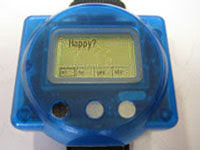
Another type of wearable technology comes in the form of a watch (pictured below), but it's use is far greater. It measures a person's stress level through several sensors that gather information about the user and the environment. It will ask questions and transmit answers to a central computer to reveal correlations between environmental factors that may increase the risk of heart disease and stroke. This study is sponsored by the National Institutes of Health. With using technology to study humans, are we going to be able to answer the question: what causes certain health problems? Is it worth the money if it helps us to live longer, or is it pointless because of how badly we treat our bodies anyway? How far is technology going to go in saving our lives?

How about transforming a phone to becoming "an angel on your shoulder?" Alex Kass and his team from the Accenture Technology Lab in Palo Alto, California is working on the Mobile Personal Services platform (the angel) "capable of running a number of personal coaching applications to help someone be more effective both at home and on the job." The first module has been designed for salespeople as they interact with co-workers or sales contacts. The salespeople wear a handset in combination with wearable sensors and a personal area network employing Blue tooth, as well as connecting to servers to do the heavy analytics lifting. With technology doing the work for us, are people going to be as smart 100 years from now as they are today, or is technology just going to destroy our minds? Will we even have to think in the future? The use of calculators has stopped several people from knowing how to do simple math. Is the advances of technology, such as "an angel on your shoulder" to find information for you, going to do the same thing in other area of our lives?
Pictures and information found at: http://www.redwoodhouse.com/wearable/ and http://www.wearitatwork.com/